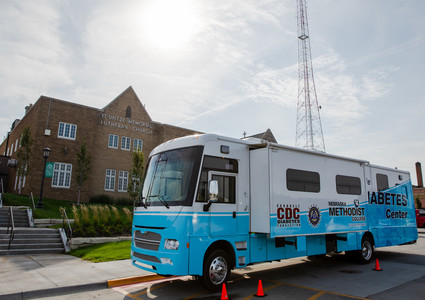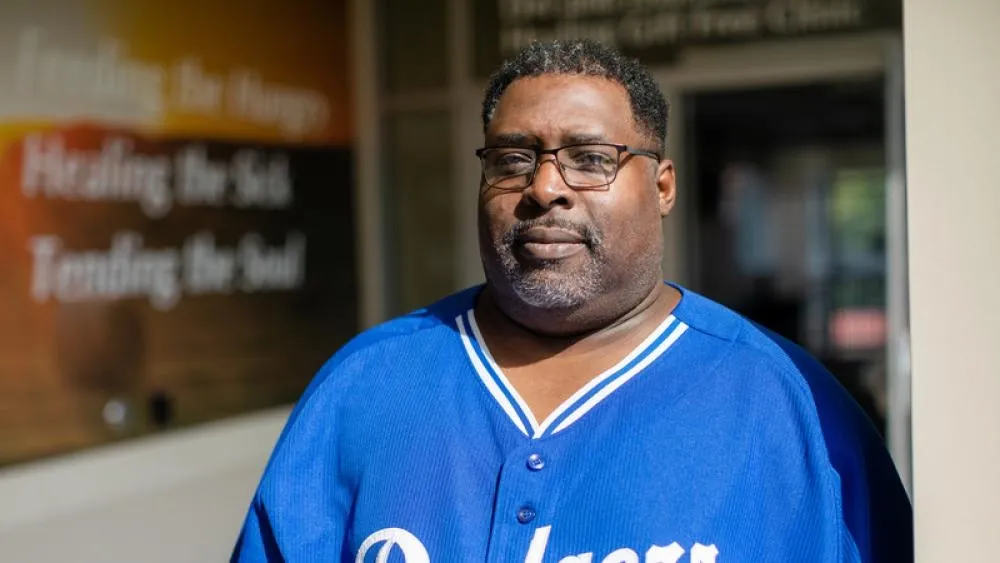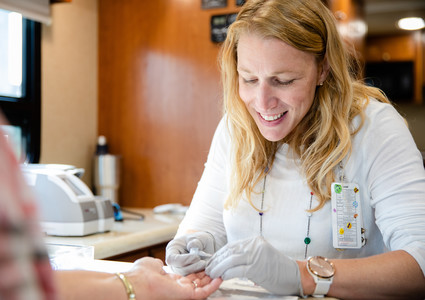
Healthy Lifestyle
'Life Is Not Over for Me Yet': Methodist College Class Helps People at Risk for Diabetes
Published: April 23, 2020

Ten years ago, Eric Lockett’s career was taking off.
He had an office job with a well-known Omaha employer, and he was pursuing his master’s degree.
But below the surface, Eric’s mental and physical health were suffering.
He had trouble handling the combined stress of his job and school. As he poured himself into getting results at work and completing his studies, he turned to soda to get a boost, and exercise became an afterthought.
“It wasn’t exactly healthy how I was treating my body,” said Eric, who is 51. “I wasn’t taking care of myself.”
As his body was “breaking down,” he also experienced a depressive episode. That’s when Eric decided to take a step back. He left his job, put school on hold and moved in with his mother.
“Sometimes God has a way of humbling you, even if you’re not ready for it,” he said.

An Up-and-Down Battle
Moving back home helped Eric mentally, but his struggle with maintaining a healthy lifestyle continued. He knew he was at risk for diabetes – numerous family members had the disease – but he needed an extra push to get his health back on track.
Things began looking up after a series of events last year. One winter day he boarded the Nebraska Methodist College (NMC) Mobile Diabetes Center during one of its regular visits to Phil's Cash Saver grocery store in north Omaha.
The volunteer staff took Eric’s blood pressure. Normal. He weighed in at over 350 pounds. But it was the result of his A1C test – a measure of his blood glucose level – that got his attention. Eric’s A1C level was 5.8%, which is considered prediabetic. He made an appointment with his doctor, who had similar findings after testing him. He connected Eric with a dietitian.
Eric saw some success, losing weight and lowering his A1C level. But it was a roller coaster. He boarded the mobile center again in the spring for an A1C test and learned about a free lifestyle modification class for people at risk for Type 2 diabetes. He knew he needed help, so he signed up.
The ups and downs continued in the months leading up to the class, which began in September. Eric’s weight climbed back to nearly 350 pounds, his A1C level was 6.1%, and his doctor prescribed the diabetes drug Metformin.
“At that point, I had to really take it seriously,” Eric said. “I needed some guidance.”
More Than Just a Class
The yearlong lifestyle modification class, led by NMC instructors, is part of the National Diabetes Prevention Program and a partnership between NMC, Methodist Community Benefits, Methodist Hospital Foundation and the Cornbelt Diabetes Connection.
The goal is to reach underserved populations in the community by addressing common barriers to diabetes education – cost and location. Eric’s cohort – or class – met at Kountze Memorial Lutheran Church in downtown Omaha. Future cohorts are also planned for Charles Drew Health Center’s 30 Metro location, Notre Dame Housing for seniors and the North Omaha Area Health clinic.
Instructors known as lifestyle coaches offer tips and strategies on topics such as:
- Building a healthy plate
- Eating out
- Increasing activity within a current lifestyle
- Dealing with people who don’t encourage healthy habits

“As a lifestyle coach, I can give them ideas, but I can’t know how it’s going to work within their lifestyle,” said Jillian Krumbach, DNP, RN, chief student and community engagement officer at Nebraska Methodist College. “It’s not about forcing people to make lifestyle changes. It’s about helping them figure out how lifestyle changes can work in their current lives.”
If other needs are identified, instructors work to pair participants with resources that best fit their situations.
Eric said he feels a connection with his classmates, which makes discussing and tackling his challenges easier.
“Throughout the course we’ve become pretty good friends,” he said. “It’s not just a class. It’s sort of like a support group.”
The open atmosphere extends to the instructors, who are also sharing their struggles.
“We’re all human, and we all have challenges,” Krumbach said. “I think it’s important that the lifestyle coaches share that. This isn’t about being perfect. This is about being who you are and trying to find a better way to live, and we’re all doing that.”
“A New Spark”
After more than six months in the class, Eric is seeing results. His weight has dropped to 321 – he’d like to get to 275 – and his A1C levels are in the normal range. He’s trying to be a healthy influence on his family and friends. And he’s considering going back to school.
“This has been a real eye-opening and pleasurable experience,” he said. “It’s given me a new spark. Life is not over for me yet.”
That kind of outcome is exactly what the class aims to achieve, Krumbach said.
“It’s students like Eric that make us go every week with renewed energy and excitement because we’re really truly able to facilitate a group that can make a real difference in people’s lives,” she said.
More Resources
- Learn more about Methodist's diabetes services
- Read how the Methodist Community Health Clinic is breaking down the barriers to care
- Follow Methodist on Facebook, Twitter and Instagram


